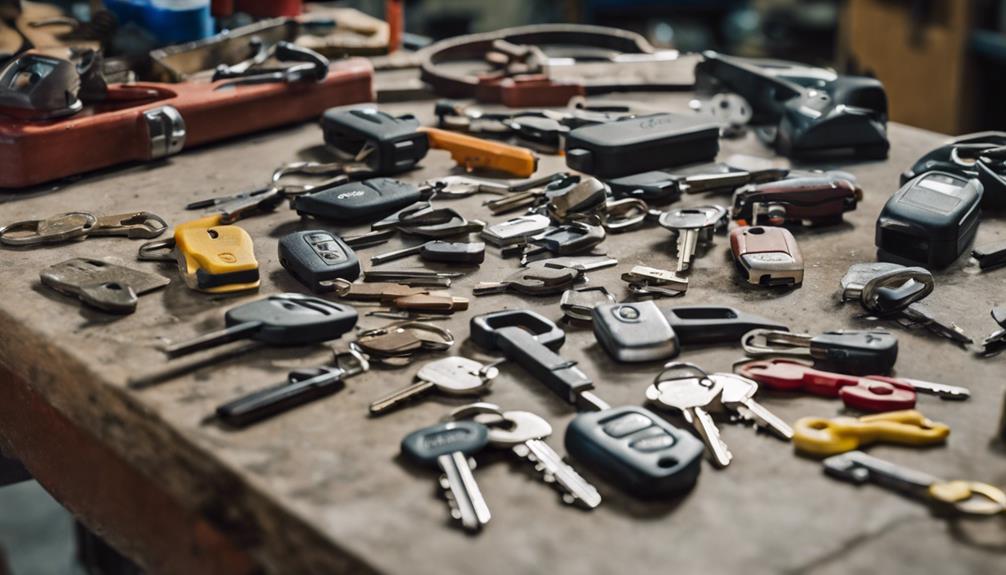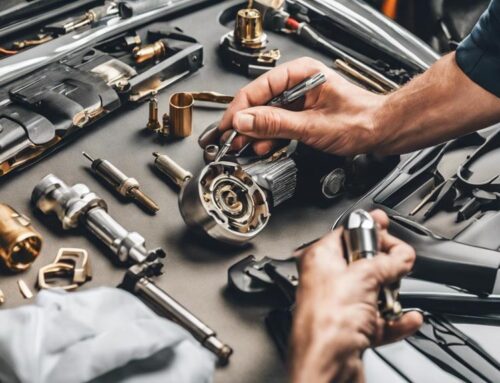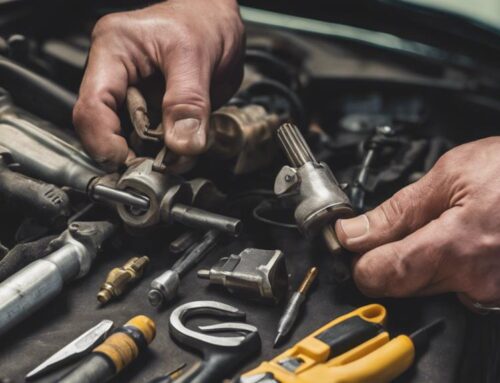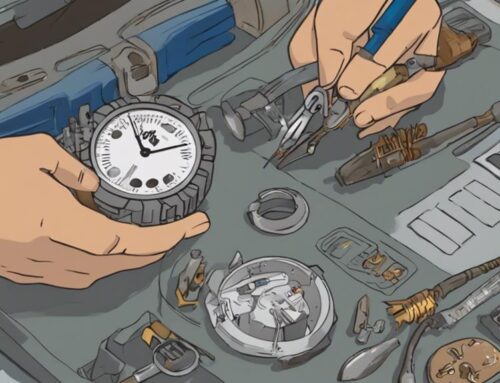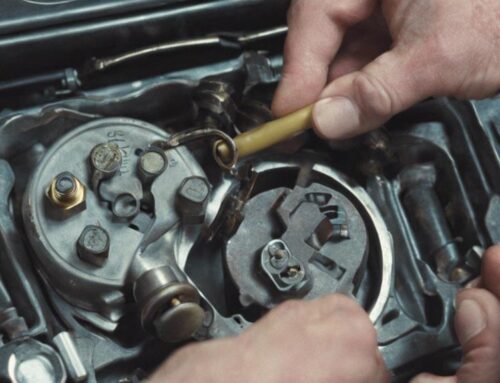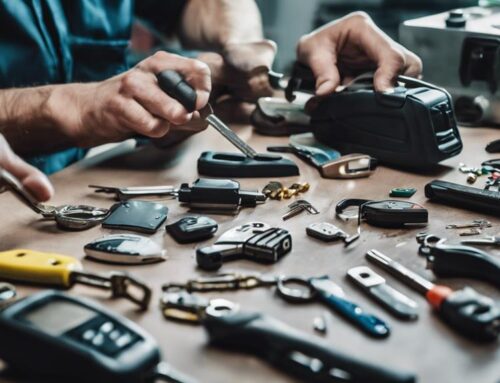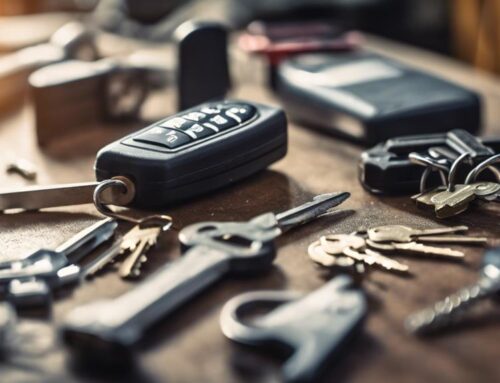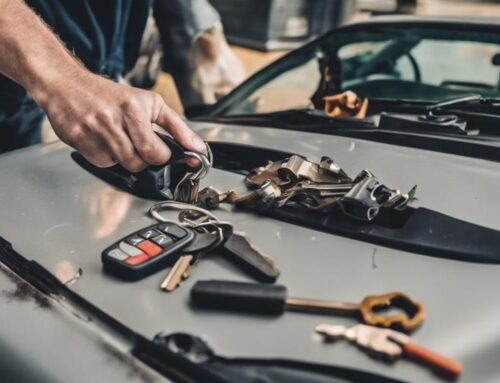Losing your car keys might feel like the end of the world, but it's actually just the tip of the iceberg when it comes to the common problems with car key cutting. You've probably encountered issues like inaccurate measurements or dull cutting blades, and these can lead to frustrating malfunctions. To make sure your keys stay functional and intact, you'll want to contemplate some effective strategies. What if you could not only safeguard your keys but also prevent future mishaps? Let's explore some practical solutions together.
Key Takeaways
- Worn or damaged original keys can lead to inaccurate duplicates; always use reputable locksmiths for reliable key cutting.
- Regularly inspect keys for wear and corrosion, and replace them when necessary to prevent malfunctions.
- Store keys in designated holders and avoid clutter to minimize the risk of misplacement and damage.
- Ensure proper key storage conditions by avoiding extreme temperatures and humidity to prolong key lifespan.
- Invest in digital tracking systems to easily locate keys and prevent loss.
Common Key Cutting Issues
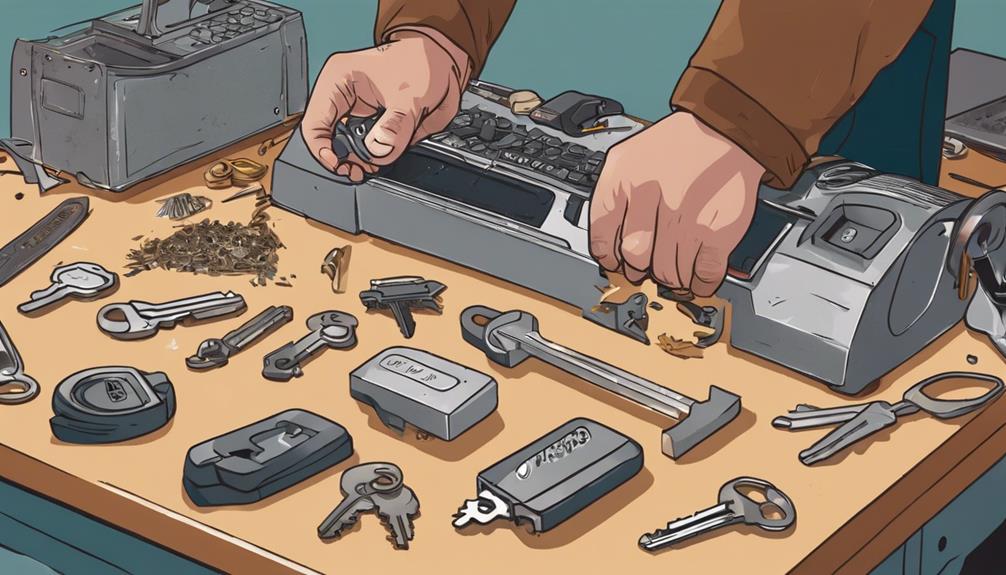
When dealing with car key cutting, you might encounter several common issues that can hinder the process. One primary concern is key duplication accuracy. If the original key is worn or damaged, the copy may not function correctly, leading to potential security breaches. Additionally, modern keys often incorporate advanced security features, such as transponders or chips, which require specialized equipment for accurate duplication. Failing to account for these features can result in keys that won't start your vehicle or trigger its security system. To mitigate these problems, always use a reputable locksmith equipped with the necessary technology. Verify they're familiar with your vehicle's specific requirements, so you can confidently secure your car without compromising its integrity. Locksmiths have the expertise and tools to handle various key types, including smart keys, key fobs, and high-security keys.
Inaccurate Key Measurements
Inaccurate key measurements frequently lead to problems during the car key cutting process. When you don't verify key measurement accuracy, you risk creating a key that won't fit your ignition or locks properly. This can result in frustration and wasted time. To prevent this, always confirm the specifications of your original key before cutting. Additionally, make certain that the cutting machine calibration is precise. A well-calibrated machine is essential for maintaining consistency in measurements and cuts. By regularly checking and adjusting your equipment, you can greatly reduce the chances of errors. Remember, investing time in accurate measurements and proper calibration will not only save you from future headaches but also empower you to create reliable, functional keys every time. Locksmiths are typically equipped to handle key cutting for a wide range of vehicles, including all types of vehicles.
Dull Cutting Blades
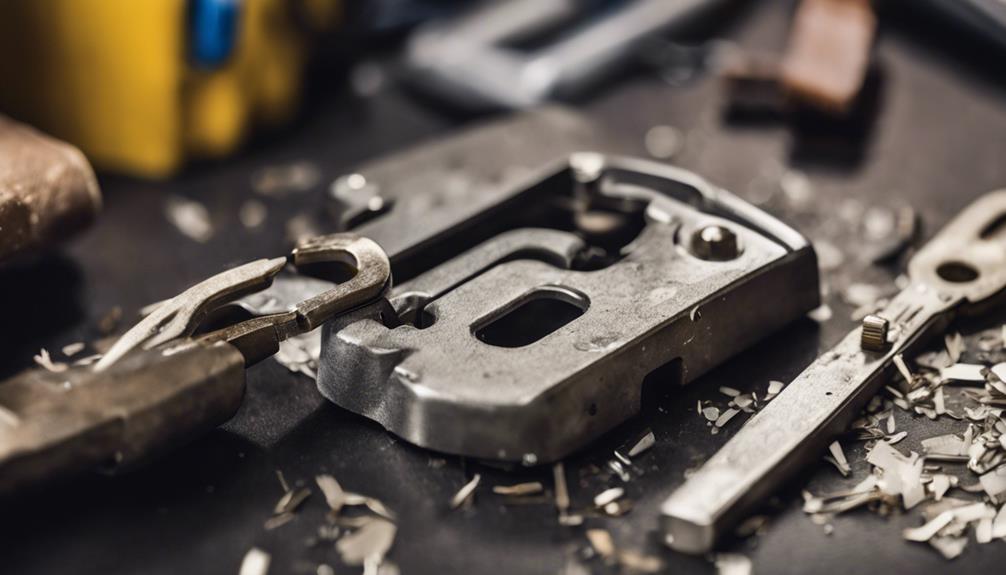
Dull cutting blades can greatly impact the key cutting process, leading to imprecise cuts and potential key malfunction. When you use a blunt blade, the machine struggles to make clean, accurate incisions, which can result in keys that don't fit or work properly. To prevent this issue, prioritize regular blade maintenance. Consistently inspect and sharpen your blades, ensuring they deliver peak cutting precision. If you notice any signs of wear or degradation, replace them immediately to maintain high standards of key cutting. Remember, the effectiveness of your key cutting directly correlates with the condition of your blades. By staying proactive about blade upkeep and utilizing essential tools for car key cutting, such as transponder key programming tools, you can considerably reduce the likelihood of key-related problems and enhance your overall experience.
Poor Quality Materials
When you choose car keys made from poor quality materials, you're risking both their durability and your investment. While cheaper options may seem appealing, they often lead to more frequent replacements and repairs. Look out for signs of inferior materials, like excessive wear or bending, to guarantee you're getting a reliable product.
Impact on Durability
Durability is essential when it comes to car key cutting, as the quality of materials used directly impacts the longevity of your keys. Poor quality materials can lead to weakened structures, resulting in a reduced key lifespan. When you choose low-grade metals or plastic, you risk your key breaking or bending during regular use.
| Material Quality | Key Lifespan | Cutting Techniques |
|---|---|---|
| High-Quality | 10+ years | Precision Cutting |
| Medium Quality | 5-10 years | Standard Cutting |
| Low-Quality | Inaccurate Cutting |
Investing in superior materials and effective cutting techniques guarantees you maintain a robust, reliable key for your vehicle, avoiding unnecessary replacements and frustration.
Cost vs. Quality
How often do you consider the balance between cost and quality when having your car keys cut? Opting for cheaper key cutting techniques might save you a few bucks initially, but it often leads to subpar results. Poor quality materials used in low-cost key duplication methods can compromise the integrity of your keys, making them prone to breakage or malfunction. When you choose high-quality materials, you guarantee that your keys withstand daily wear and tear, ultimately saving you money in the long run. Investing in quality not only enhances durability but also ensures precise cuts that align perfectly with your vehicle's locking mechanism. Remember, a small upfront cost can lead to significant savings and security in the future. Choose wisely. Can Locksmiths Replace All Types of Car Keys
Signs of Inferior Materials
Identifying signs of inferior materials in car key cutting is essential for guaranteeing the longevity and functionality of your keys. When examining key material types, look for visible defects like rough edges or inconsistent cuts, which can indicate subpar craftsmanship. A key made from low-grade metals may bend or break easily, compromising its durability. Additionally, check for a lightweight feel; quality keys typically have a solid weight due to stronger materials. Pay attention to the finish as well; a poor coating can wear off quickly, exposing the metal underneath. Understanding these key durability factors helps you avoid costly replacements. Prioritize quality and perform due diligence when selecting a key cutting service to guarantee your keys stand the test of time.
Key Programming Challenges
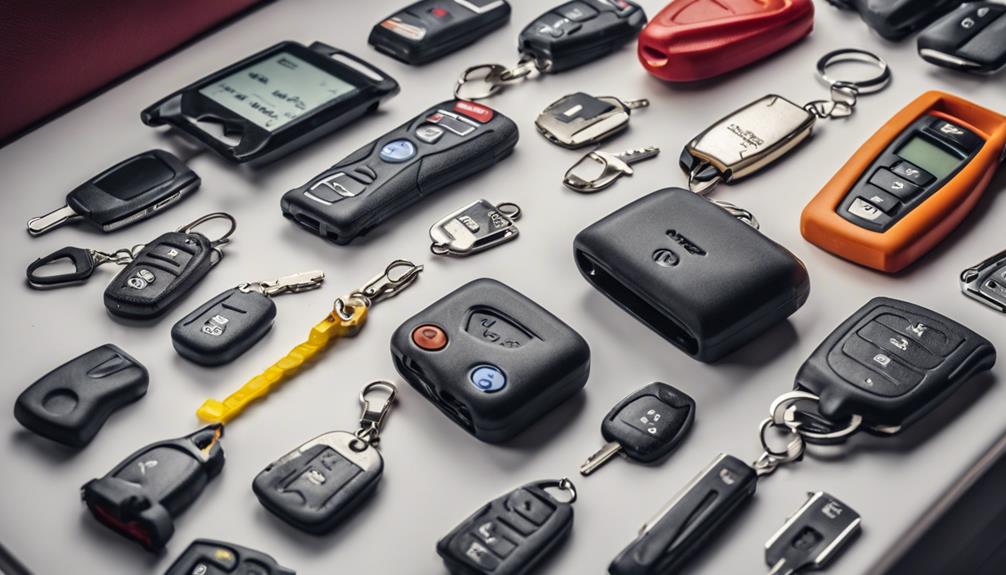
Key programming challenges often arise when dealing with modern vehicle security systems. These systems utilize complex technology that can lead to several issues. Understanding these challenges will empower you to navigate them effectively:
- Transponder Issues: Compatibility problems between the key and vehicle can prevent successful programming. Locksmiths may be able to program a transponder key without the original by using specialized tools and expertise, but it can be a complex process. Learn more about transponder key programming.
- Software Updates: Outdated software in your key-cutting device can hinder proper key programming.
- Incorrect Procedures: Failing to follow the manufacturer's specific programming steps can result in failure.
- Security Protocols: Some vehicles have advanced security features that require special tools or expertise for key programming.
Tips for Key Preservation
To keep your car keys in top condition, proper storage is essential—always use a designated key holder to prevent damage. Regularly inspect your keys for signs of wear or corrosion to catch issues early. Additionally, avoid exposing your keys to extreme temperatures or moisture, as these conditions can compromise their integrity. Remember, signs of wear or corrosion could indicate the need for replacement or reprogramming, as discussed in Signs Your Car Key Needs Replacement or Reprogramming.
Proper Key Storage
Proper storage of car keys plays an essential role in their longevity and functionality. To guarantee effective key organization and prevent loss or damage, consider these storage solutions:
- Dedicated Key Hooks: Install hooks near your entryway to keep keys accessible yet organized.
- Key Fob Cases: Use protective cases to shield electronic fobs from wear and tear.
- Magnetic Key Holders: Place magnetic holders on metal surfaces, providing a discreet storage option.
- Keychain Identification: Use labeled keychains to differentiate between multiple keys easily.
Regular Key Inspection
Have you ever wondered how often you should inspect your car keys to guarantee they function properly? Regular key inspection is essential for ensuring key longevity and avoiding unexpected failures. Implement a routine maintenance schedule to examine your keys for wear, bending, or damage.
| Inspection Aspect | Recommended Frequency |
|---|---|
| Visual Check | Monthly |
| Physical Test | Bi-Monthly |
| Lubrication | Every 6 Months |
| Replacement Check | Annually |
Avoid Extreme Conditions
Extreme weather conditions can greatly impact the integrity and functionality of your car keys. To preserve your keys and guarantee they operate effectively, follow these essential tips:
- Store keys in a climate-controlled environment: Extreme temperatures can warp or damage key materials.
- Avoid exposure to direct sunlight: Prolonged UV exposure can degrade plastic components, affecting key performance.
- Keep keys dry: Humidity effects can cause rust or corrosion, primarily in metal keys and components.
- Limit exposure to extreme cold: Cold temperatures can make keys brittle, increasing the risk of breakage.
Best Practices for Key Storage
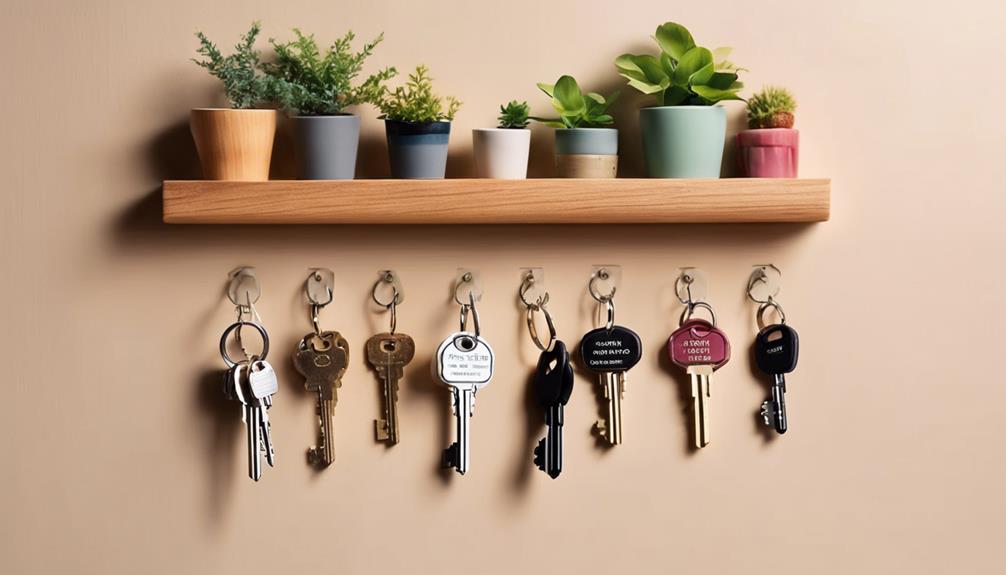
One key practice for effective key storage is to designate a specific location in your home for all car keys. This enhances key organization and guarantees you always know where your keys are. Consider using a wall-mounted key holder or a dedicated drawer, and avoid clutter that can lead to misplacement. For added security and efficiency, invest in a digital tracking system. These devices can help you locate your keys with a simple app on your smartphone. Regularly audit your key collection to remove any keys that are no longer needed, minimizing confusion. By implementing these best practices, you'll reduce the risk of losing or damaging your keys, empowering you with greater control over your vehicle access.
Low Rate Locksmith Services
When searching for reliable locksmith services, it is essential to evaluate low-rate options that don't compromise on quality. You want to make sure that you're getting value without risking your security. Here are four key points to take into account:
- Locksmith Reputation: Research the service's standing in the community; a good reputation speaks volumes. Make certain to look for any certifications and reviews that showcase their professionalism.
- Customer Reviews: Read what others have to say; consistent positive feedback is a strong indicator of reliability.
- Certification: Check for necessary licenses and certifications to verify professional standards.
- Service Range: Confirm they offer a thorough range of services, from key cutting to emergency lockouts, to meet all your needs.

